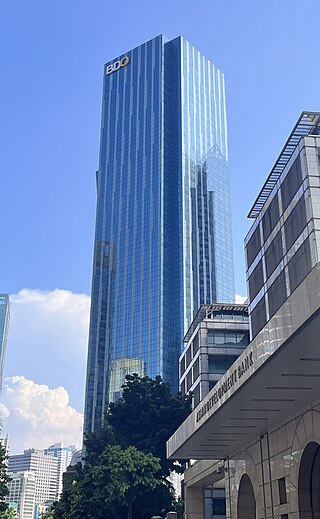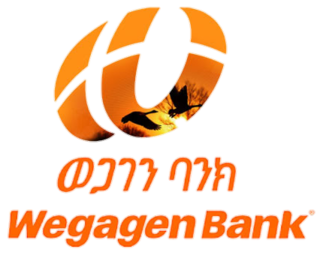
Financial services are economic services tied to finance provided by financial institutions. Financial services encompass a broad range of service sector activities, especially as concerns financial management and consumer finance.
Commercial Bank of Ceylon PLC (CBC) also known as ComBank is a licensed commercial bank in Sri Lanka and its ownership is private. It was incorporated as a public limited company and it is listed on the Colombo Stock Exchange. It is regarded as the largest private bank in Sri Lanka in terms of net worth and capital. The bank is currently the third largest bank in Sri Lanka in terms of total net assets and it lies behind only Bank of Ceylon and People's Bank. It is also the only private sector licensed bank in Sri Lanka to be designated as the higher-tier domestic systemically important bank according to the Central Bank of Sri Lanka. The bank currently operates a network of 268 branches and around 932 ATM machines across Sri Lanka.
GE Capital was the financial services division of General Electric. Its various units were sold between 2013 and 2021, including the notable spin-off of the North American consumer finance division as Synchrony Financial. Ultimately, only one division of the company remained, GE Energy Financial Services, which was transferred to GE Vernova when General Electric was broken up.

Bank of New Zealand (BNZ) is one of New Zealand's big four banks. It has been operating since October 1861, and since 1992 has been owned by National Australia Bank (NAB), retaining local governance with a New Zealand board of directors. The bank operates a variety of financial services covering retail, business, and institutional banking.

Postal savings systems provide depositors who do not have access to banks a safe and convenient method to save money. Many nations have operated banking systems involving post offices to promote saving money among the poor.

The Hongkong and Shanghai Banking Corporation Limited, commonly abbreviated as HSBC and formerly known as HongkongBank, is the Hong Kong-based Asia-Pacific subsidiary of the HSBC banking group, for which it was the parent entity until 1991. The largest bank in Hong Kong, HSBC operates branches and offices throughout the Indo-Pacific region and in other countries around the world. It is also one of the three commercial banks licensed by the Hong Kong Monetary Authority to issue banknotes for the Hong Kong dollar.

BDO Unibank, Inc., commonly known as Banco de Oro (BDO), is a Philippine banking company based in Mandaluyong, the Philippines. BDO Unibank is a member of the SM Group and so can be found at SM Malls throughout the country.

The Metropolitan Bank & Trust Company, commonly known as Metrobank, is the third largest bank in the Philippines in terms of total assets. It offers various financial services, from regular banking to insurance. It is the commercial and retail banking arm of GT Capital Holdings Inc.
Equitable PCI Bank, Inc. was one of the largest banks in the Philippines, being the third-largest bank in terms of assets. It was the largest bank before it was overtaken by Metrobank in 1995. It is the result of the merger of Equitable Banking Corporation and Philippine Commercial International Bank or PCIBank. It was known for a wide range of services from savings to insurance and, through its wholly owned subsidiary Equitable Card Network, was the largest Philippine credit card issuer. The bank merged with Banco de Oro Universal Bank in early 2007, and is now branded as BDO as its new identity as part of the new Banco de Oro Unibank, Inc.
The National Bank of Ethiopia is the central bank of Ethiopia. Its headquarters are in the capital city of Addis Ababa. Mamo Mihretu is the current governor of the bank.

The Philippine National Bank is one of the largest banks in the Philippines. It was established by the Philippine government on July 22, 1916, during the American Era.

The Commercial Bank of Ethiopia (CBE) is the largest commercial bank in Ethiopia. As of June 2021, it had about 1.1 trillion birr in assets and held approximately 67% of deposits and about 53% of all bank loans in the country. The bank has around more than 35,000 employees as of June 2022, who staff its headquarters and its over 1000+ branches positioned in the main cities and regional towns. The latter include 120 branches in the national capital Addis Ababa. With the opening of a branch in the Gechi in the Illubabor Zone, CBE's banking network has reached online 783 branches. The bank has reached more than 1950 branches as of 10 August 2022.

National Bank of Egypt is a bank founded in Egypt in June 1898, and is the country's largest bank (2013) in terms of assets, deposits, loans, bank-capital, number of total branches, and employees.
China's banking sector had CN¥319.7 trillion in assets at the end of 2020. The "Big Four" state-owned commercial banks are the Bank of China, the China Construction Bank, the Industrial and Commercial Bank of China, and the Agricultural Bank of China, all of which are among the largest banks in the world As of 2018. Other notable big and also the largest banks in the world are China Merchants Bank and Ping An Bank.

Following the Iranian Revolution, Iran's banking system was transformed to be run on an Islamic interest-free basis. As of 2010 there were seven large government-run commercial banks. As of March 2014, Iran's banking assets made up over a third of the estimated total of Islamic banking assets globally. They totaled 17,344 trillion rials, or US$523 billion at the free market exchange rate, using central bank data, according to Reuters.

Westpac Banking Corporation, known simply as Westpac, is an Australian multinational banking and financial services company headquartered at Westpac Place in Sydney.

A bank is a financial institution that accepts deposits from the public and creates a demand deposit while simultaneously making loans. Lending activities can be directly performed by the bank or indirectly through capital markets.

Cooperative Bank of Oromia is a private commercial bank in Ethiopia. As per their last published Annual report (2021-22), the Cooperative Bank now has a total asset value ETB 140 Billion. The bank has 750+ branches, 13.2 million account holders and 8,100 employees. The bank's headquarters is located in Addis Ababa, Ethiopia.

Wegagen Bank SC is an Ethiopia bank that was incorporated in 1997. The bank provides retail banking services to individuals and businesses in Ethiopia.

The banking sector of Ethiopia composed of the central bank, the National Bank of Ethiopia (NBE) and Development Bank of Ethiopia (DBE), which are state owned and thirty private banks. By 2020, the NBE planned to increase the minimum capital for banks to operate to 2 billion birr and instructed all commercial banks to increase their capital. Foreign banks did not allow to provide service in Ethiopia, instead use medium term as the government of Prime Minister Abiy Ahmed pursues wide economic reforms.














